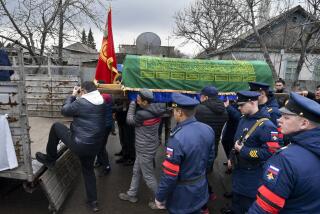Countywide : Volunteers Rise Again in Russia
- Share via
Virtually nonexistent during Soviet rule, volunteerism is once again emerging in Russia, thanks in part to the growth of democracy in that country, according to the executive director of the Volunteer Center of Greater Orange County, who visited Moscow last month.
Under a less suspicious government, nonprofit groups and charitable organizations have blossomed over the past few years, Carol Stone said Tuesday.
Stone said that the need for Russians to volunteer is even greater now because the market reforms that accompanied the birth of democracy have wreaked havoc on the lives of the Russian people.
“It’s common to see pensioners selling eyeglasses, a pencil, or any item--just to eat,” said Stone, who spent May in Moscow as a member of a team that trained volunteers and managers of volunteer organizations.
The U.S. Agency for International Development paid for the Moscow trip, which was coordinated by the Points of Light Foundation and the Moscow Charity House, a volunteer center in Russia, Stone said.
She and Claire Martin, director of special groups development for the Points of Light Foundation, conducted workshops and developed a volunteer management workbook that will later be translated into Russian and published there.
“The greatest need is to develop a system that will provide a structured way for strategic and financial planning,” Stone said.
Other experts on volunteerism will arrive in Moscow later this year and next to help the Russians learn how to plan, raise money and use volunteers more effectively, she said.
“Volunteerism was part of the Russian tradition,” Stone said. “But during the Communist regime, it was coercion. You (didn’t) volunteer.”
A Russian immigrant who now owns a consulting business in Irvine said that nonprofit groups are emerging in Russia because people feel a new sense of freedom.
“Because there is the beginning of democracy, nonprofit and charitable organizations are showing up,” said Boris I. Gurevich, a director of the Volunteer Center of Greater Orange County. But he said most Russians are still cynical about any organized social service effort.
“In the past, every organized effort was done by the government,” said Gurevich, who came to the United States in 1981.
He said that the Russian people will need the help of charitable organizations because of continuing economic dislocation in his former homeland.
“The time of guaranteed income for everybody is gone,” Gurevich said. “Now, people have to work two to three jobs just to survive.”
The typical Russian volunteer is about age 60 and is a former doctor, lawyer or engineer who is “extremely frustrated by the chaos and wants things to get better,” Stone said.
Some volunteer because they can receive additional food or clothing from the groups they work for, she said.
A volunteer Stone met in Moscow, Nina Milakova, 72, is a former doctor who now lives alone in a tiny apartment. She helps distribute clothing, food and medical equipment to people in her apartment complex.
Stone, a former teacher who taught for a year in Libya, said she was impressed with the resilience of the Russian people.
“They have suffered so, and yet they to to keep on going,” Stone said.
More to Read
Sign up for Essential California
The most important California stories and recommendations in your inbox every morning.
You may occasionally receive promotional content from the Los Angeles Times.













